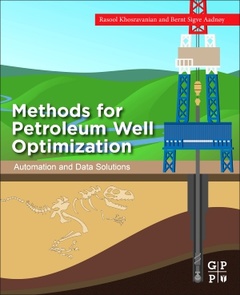Methods for Petroleum Well Optimization Automation and Data Solutions
Auteurs : Khosravanian Rasool, Aadnoy Bernt S.

Drilling and production wells are becoming more digitalized as oil and gas companies continue to implement machine learning and big data solutions to save money on projects while reducing energy and emissions. Up to now there has not been one cohesive resource that bridges the gap between theory and application, showing how to go from computer modeling to practical use. Methods for Petroleum Well Optimization: Automation and Data Solutions gives today?s engineers and researchers real-time data solutions specific to drilling and production assets. Structured for training, this reference covers key concepts and detailed approaches from mathematical to real-time data solutions through technological advances. Topics include digital well planning and construction, moving teams into Onshore Collaboration Centers, operations with the best machine learning (ML) and metaheuristic algorithms, complex trajectories for wellbore stability, real-time predictive analytics by data mining, optimum decision-making, and case-based reasoning. Supported by practical case studies, and with references including links to open-source code and fit-for-use MATLAB, R, Julia, Python and other standard programming languages, Methods for Petroleum Well Optimization delivers a critical training guide for researchers and oil and gas engineers to take scientifically based approaches to solving real field problems.
1. Introduction to Digital Twin, Automation and Real-Time Centers 2. Petroleum Well Optimization 3. Wellbore Friction Optimization 4. Wellbore trajectory optimization 5. Wellbore Hydraulics and Hole Cleaning: Optimization and digitalization 6. Mechanical Specific Energy (MSE) and Drilling efficiency 7. Data-driven Machine Learning Solutions to Real-Time ROP Prediction 8. Advanced Approaches and Technology for Casing Setting Depth Optimization 9. Data Mining in Digital Well Planning and Well Construction 10. Well Completion Optimization by Decision-Making 11. Monte Carlo Simulation in Wellbore Stability Optimization 12. Case-Based Reasoning (CBR) in Digital Well Planning and Construction
Bernt Sigve Aadnøy is a Professor of Petroleum Engineering at the University of Stavanger, specializing in all aspects of well engineering, including geomechanics. He is also an Adjunct Professor at NTNU—the Norwegian University of Science and Technology in Trondheim. He worked for major operators in the oil industry from 1978 until 1994, when he transitioned to academia. Aadnøy has published more than 300 papers, holds 15 patents, and has authored or co-authored seven books, among them Modern Well Design, Petroleum Rock
Mechanics, and Mechanics of Drilling. He was also one of the editors of the SPE book Advanced Drilling and Well Technology (Society of Petroleum Engineers). Aadnøy holds a BS degree in m
- Bridges the gap between theory and practice (from models to code) with content from the latest research developments supported by practical case study examples and questions at the end of each chapter
- Enables understanding of real-time data solutions and automation methods available specific to drilling and production wells, such as digital well planning and construction through to automatic systems
- Promotes the use of open-source code which will help companies, engineers, and researchers develop their prediction and analysis software more quickly; this is especially appropriate in the application of multivariate techniques to the real-world problems of petroleum well optimization
Date de parution : 09-2021
Ouvrage de 552 p.
19x23.4 cm
Thème de Methods for Petroleum Well Optimization :
Mots-clés :
Data science; digital oilfield; machine learning; oil and gas; digital twins; plant architecture; KPI; project management; algorithms; ML applications; digital energy; predictive data analytics; digital oil and gas; big data; data-driven; drilling; production; automation; well path; MATLAB; ROP; riserless drilling; casing; drill bits; managed pressure drilling; digital well; onshore collaboration center; well trajectory; hydraulics; bit optimization; mechanical specific energy; well completion



